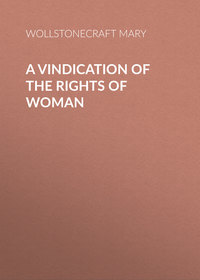 полная версия
полная версияMary Wollstonecraft's Original Stories
The sky began to thicken, and the lowing of the cattle to have a melancholy cadence; the nightingale forgot her song, and fled to her nest; and the sea roared and lashed the rocks. During the calm which portended an approaching storm, every creature was running for shelter. – We must, if possible, said Mrs. Mason, reach yon cottage on the cliff, for we shall soon have a violent thunder-storm. They quickened their pace, but the hurricane overtook them. The hail-stones fell, the clouds seemed to open and disclose the lightning, while loud peals of thunder shook the ground; the wind also in violent gusts rushed among the trees, tore off the slender branches and loosened the roots.
The children were terrified; but Mrs. Mason gave them each a hand, and chatted with them to dispel their fears. She informed them that storms were necessary to dissipate noxious vapours, and to answer many other purposes, which were not, perhaps, obvious to our weak understandings. But are you not afraid? cried the trembling Caroline. No, certainly, I am not afraid. – I walk with the same security as when the sun enlivened the prospect – God is still present, and we are safe. Should the flash that passes by us, strike me dead, it cannot hurt me, I fear not death! – I only fear that Being who can render death terrible, on whose providence I calmly rest; and my confidence earthly sorrows cannot destroy. A mind is never truly great, till the love of virtue overcomes the fear of death.
By this time they had mounted the cliff, and saw the tumultuous deep. The angry billows rose, and dashed against the shore; and the loud noise of the raging sea resounded from rock to rock.
They ran into the cottage; the poor woman who lived in it, sent her children for wood, and soon made a good fire to dry them.
The father of the family soon after came in, leaning on crutches; and over one eye there was a large patch. I am glad to see you honest Jack, said Mrs. Mason, come and take your seat by the fire, and tell the children the story of your shipwreck.
He instantly complied. I was very young, my dear ladies, said Jack, when I went to sea, and endured many hardships, – however I made a shift to weather them all; and whether the wind was fair or foul, I ran up the shrouds and sung at the helm. I had always a good heart, no lad fore or aft had a better; when we were at sea, I never was the first to flinch; and on shore I was as merry as the best of them. I married she you see yonder, (lifting his crutch to point to his wife) and her work and my wages did together, till I was shipwrecked on these rocks. Oh! it was a dreadful night; this is nothing to it; but I am getting to the end of my story before I begin it.
During the war, I went once or twice to New York. The last was a good voyage, and we were all returning with joy to dear England, when the storm rose; the vessel was like a bird, it flew up and down, and several of our best hands were washed clean overboard – My poor captain! a better never plowed the ocean, he fell overboard too, and it was some time before we missed him; for it was quite dark, except that flashes of lightning, now and then, gave us light. I was at the helm, lashing it to the side of the ship – a dreadful flash came across me, and I lost one of my precious eyes. – But thank God I have one left.
The weather cleared up next day, and, though we had been finely mauled, I began to hope, for I hate to be faint-hearted, and certainly we should have got into the channel very soon, if we had not fell in with a French man of war, which took us; for we could not make any resistance.
I had a dog, poor Pompey! with me. Pompey would not leave me, he was as fond of me as if he had been a christian. I had lost one eye by the lightning, the other had been sore, so that I could hardly call it a peep-hole. Somehow I fell down the hatchway, and bruised one of my legs; but I did not mind it, do ye see, till we arrived at Brest and were thrown into a French Prison.
There I was worse off than ever; the room we were all stowed in, was full of vermin, and our food very bad; mouldy biscuits, and salt fish. The prison was choke full, and many a morning did we find some honest fellow with his chops fallen – he was not to be waked any more! – he was gone to the other country, do ye see.
Yet the French have not such hard hearts as people say they have! Several women brought us broth, and wine; and one gave me some rags to wrap round my leg, it was very painful, I could not clean it, nor had I any plaister. One day I was looking sorrowfully at it, thinking for certain I should lose my precious limb; when, would you believe it? Pompey saw what I was thinking about, and began to lick it. – And, I never knew such a surprizing thing, it grew better and better every day, and at last was healed without any plaister.
After that I was very sick, and the same tender-hearted creature who gave me the rags, took me to her house; and fresh air soon recovered me. I for certain ought to speak well of the French; but for their kindness I should have been in another port by this time. Mayhap I might have gone with a fair wind, yet I should have been sorry to have left my poor wife and her children. But I am letting all my line run out! Well, by-and-by, there was an exchange of prisoners, and we were once more in an English vessel, and I made sure of seeing my family again; but the weather was still foul. Three days and nights we were in the greatest distress; and the fourth the ship was dashed against these rocks. Oh! if you had heard the crash! The water rushed in – the men screamed, Lord have mercy on us! There was a woman in the ship, and, as I could swim, I tried to save her, and Pompey followed me; but I lost him – poor fellow! I declare I cried like a child when I saw his dead body. However I brought the woman to shore; and assisted some more of my mess-mates; but, standing in the water so long, I lost the use of my limbs – yet Heaven was good to me; Madam, there, sent a cart for us all, and took care of us; but I never recovered the use of my limbs. So she asked me all about my misfortunes, and sent for wife, who came directly, and we have lived here ever since. We catch fish for Madam, and watch for a storm, hoping some time or other to be as kind to a poor perishing soul as she has been to me. Indeed we are very happy – I might now have been begging about the streets, but for Madam, God bless her.
A tear strayed down Mrs. Mason’s cheek, while a smile of benevolence lighted up her countenance – the little girls caught each hand – They were all silent a few minutes when she, willing to turn the discourse, enquired whether they had any fish in the house? Some were produced, they were quickly dressed, and they all eat together. They had a chearful meal, and honest Jack sung some of his seafaring songs, and did all he could to divert them and express his gratitude. Getting up to reach the brown loaf, he limped very awkwardly, Mary was just beginning to laugh, when she restrained herself; for she recollected that his awkwardness made him truly respectable, because he had lost the use of his limbs when he was doing good, saving the lives of his fellow-creatures.
The weather cleared up, and they returned home. The children conversed gaily with each other all the way home, talking of the poor sailor, and his faithful dog.
CHAPTER IX
The Inconveniences of immoderate Indulgence.
The children were allowed to help themselves to fruit, when it made a part of their meal; and Caroline always took care to pick out the best, or swallow what she took in a hurry, lest she should not get as much as she wished for. Indeed she generally eat more than her share. She had several times eaten more than a person ought to eat at one time, without feeling any ill effects; but one afternoon she complained of a pain in her stomach in consequence of it, and her pale face, and languid eyes, plainly shewed her indisposition. Mrs. Mason gave her an emetic, and after the operation she was obliged to go to bed, though she had promised herself a pleasant walk that evening. She was left alone, for Mary was not permitted to stay at home with her, as she offered to do. Had her sickness been accidental, we would both have tried to amuse her, said Mrs. Mason; but her greediness now receiving its natural and just punishment, she must endure it without the alleviation which pity affords; only tell her from me, that the pleasure was but momentary, while the pain and confinement it produced, has already lasted some hours.
The next morning, though scarcely recovered, she got up, as usual, to have a walk before breakfast. During these walks, Mrs. Mason told them stories, pointed out the wisdom of God in the creation, and took them to visit her poor tenants. These visits not only enabled her to form a judgment of their wants, but made them very industrious; for they were all anxious that she might find their houses and persons clean. And returning through the farmyard, Mrs. Mason stopped according to custom, to see whether the poor animals were taken care of – this she called earning her breakfast. The servant was just feeding the pigs, and though she poured a great quantity into the trough, the greedy creatures tried to gobble it up from one another. Caroline blushed, she saw this sight was meant for her, and she felt ashamed of her gluttony. But Mrs. Mason, willing to impress her still more strongly, thus addressed her.
Providence, my child, has given us passions and appetites for various purposes – two are generally obvious, I will point them out to you. First to render our present life more comfortable, and then to prepare us for another, by making us sociable beings; as in society virtue is acquired, and self-denial practised. A moderate quantity of proper food recruits our exhausted spirits, and invigorates the animal functions; but, if we exceed moderation, the mind will be oppressed, and soon become the slave of the body, or both grow listless and inactive. Employed various ways, families meet at meals, and there giving up to each other, learn in the most easy, pleasant way to govern their appetites. Pigs, you see, devour what they can get; but men, if they have any affections, love their fellow-creatures, and wish for a return; nor will they, for the sake of a brutish gratification, lose the esteem of those they value. Besides, no one can be reckoned virtuous who has not learned to bear poverty: yet those who think much of gratifying their appetites, will at last act meanly in order to indulge them. But when any employment of the understanding, or strong affection occupies the mind, eating is seldom thought a matter of greater importance than it ought to be. Let the idle think of their meals; but do you employ the intermediate time in a different manner, and only enjoy them when you join the social circle. I like to see children, and even men, eat chearfully, and gratefully receive the blessings sent by Heaven; yet I would not have them abuse those blessings, or ever let the care necessary to support the body, injure the immortal spirit: many think of the sustenance the former craves, and entirely neglect the latter.
I remarked to you before, that in the most apparently trivial concerns, we are to do as we would be done by. This duty must be practised constantly; at meals there are frequent opportunities, and I hope, Caroline, I shall never again see you eager to secure dainties for yourself. If such a disposition were to grow up with you, you ought to live alone, for no one should enjoy the advantages and pleasures which arise from social intercourse, who is unwilling to give way to the inclinations of others, and allow each their share of the good things of this life.
You experienced yesterday, that pain follows immoderate indulgence; it is always the case, though sometimes not felt so immediately; but the constitution is insensibly destroyed, and old age will come on, loaded with infirmities. You also lost a very pleasant walk, and some fine fruit. We visited Mrs. Goodwin’s garden, and as Mary had before convinced me that she could regulate her appetites, I gave her leave to pluck as much fruit as she wished; and she did not abuse my indulgence. On the contrary, she spent most part of the time in gathering some for me, and her attention made it taste sweeter.
Coming home I called her my friend, and she deserved the name, for she was no longer a child; a reasonable affection had conquered an appetite; her understanding took the lead, and she had practised a virtue.
The subject was now dropped; but, Caroline determined to copy in future her sister’s temperance and self-denial.
CHAPTER X
The Danger of Delay. – Description of a Mansion-house in Ruins. – The History of Charles Townley.
Mrs. Mason who always regulated her own time, and never loitered her hours irresolutely away, had very frequently to wait for the children, when she wished to walk, though she had desired them to be ready at a precise time. Mary in particular had a trick of putting everything off till the last moment, and then she did but half do it, or left it undone. This indolent way of delaying made her miss many opportunities of obliging and doing good; and whole hours were lost in thoughtless idleness, which she afterwards wished had been better employed.
This was the case one day, when she had a letter to write to her father; and though it was mentioned to her early in the morning, the finest part of the evening slipped away whilst she was finishing it; and her haste made her forget the principal thing which she intended to have said.
Out of breath she joined them; and after they had crossed several fields, Mrs. Mason turning down a long avenue, bade them look at a large old mansion-house. It was now in ruins. Ivy grew over the substantial walls, that still resisted the depredations of time, and almost concealed a noble arch, on which maimed lions couched; and vultures and eagles, who had lost their wings, seemed to rest for ever there. Near it was a rookery, and the rooks lived safe in the high trees, whose trunks were all covered with ivy or moss, and a number of fungusses grew about their large roots. The grass was long, and remaining undisturbed, save when the wind swept across it, was of course pathless. Here the mower never whet his scythe, nor did the haymakers mix their songs with the hoarse croaking of the rooks. A spacious basin, on the margin of which water plants grew with wild luxuriance, was overspread with slime; and afforded a shelter for toads and adders. In many places were heaped the ruins of ornamental buildings, whilst sun-dials rested in the shade; – and pedestals that had crushed the figures they before supported. Making their way through the grass, they would frequently stumble over a headless statue, or the head would impede their progress. When they spoke, the sound seemed to return again, as if unable to penetrate the thick stagnated air. The sun could not dart its purifying rays through the thick gloom, and the fallen leaves contributed to choke up the way, and render the air more noxious.
I brought you to this place on purpose this evening, said Mrs. Mason to the children, who clung about her, to tell you the history of the last inhabitant; but, as this part is unwholesome, we will sit on the broken stones of the drawbridge.
Charles Townley was a boy of uncommon abilities, and strong feelings; but he ever permitted those feelings to direct his conduct, without submitting to the direction of reason; I mean, the present emotion governed him. – He had not any strength or consistency of character; one moment he enjoyed a pleasure, and the next felt the pangs of remorse, on account of some duty which he had neglected. He always indeed intended to act right in every particular to-morrow; but to-day he followed the prevailing whim.
He heard by chance of a man in great distress, he determined to relieve him, and left his house in order to follow the humane impulse; but meeting an acquaintance, he was persuaded to go to the play, and to-morrow, he thought, he would do the act of charity. The next morning some company came to breakfast with him, and took him with them to view some fine pictures. In the evening he went to a concert; the day following he was tired, and laid in bed till noon; then read a pathetic story, well wrought up, wept over it – fell asleep – and forgot to act humanely. An accident reminded him of his intention, he sent to the man, and found that he had too long delayed – the relief was useless.
In this thoughtless manner he spent his time and fortune; never applying to any profession, though formed to shine in any one he should have chosen. His friends were offended, and at last allowed him to languish in a gaol; and as there appeared no probability of reforming or fixing him, they left him to struggle with adversity.
Severely did he reproach himself – He was almost lost in despair, when a friend visited him. This friend loved the latent sparks of virtue which he imagined would some time or other light up, and animate his conduct. He paid his debts, and gave him a sum of money sufficient to enable him to prepare for a voyage to the East Indies, where Charles wished to go, to try to regain his lost fortune. Through the intercession of this kind, considerate friend, his relations were reconciled to him, and his spirits raised.
He sailed with a fair wind, and fortune favouring his most romantic wishes, in the space of fifteen years, he acquired a much larger fortune than he had even hoped for, and thought of visiting, nay, settling in his native country for the remainder of his life.
Though impressed by the most lively sense of gratitude, he had dropped his friend’s correspondence; yet, as he knew that he had a daughter, his first determination was to reserve for her the greater part of his property, as the most substantial proof which he could give of his gratitude. – The thought pleased him, and that was sufficient to divert him for some months; but accidentally hearing that his friend had been very unsuccessful in trade, this information made him wish to hasten his return to his native country. Still a procrastinating spirit possessed him, and he delayed from time to time the arduous task of settling his affairs, previous to his departure: he wrote, however, to England, and transmitted a considerable sum to a correspondent, desiring that this house might be prepared for him, and the mortgage cleared.
I can scarcely enumerate the various delays that prevented his embarking; and when he arrived in England, he came here, and was so childishly eager to have his house fitted up with taste, that he actually trifled away a month, before he went to seek for his friend.
But his negligence was now severely punished. He learned that he had been reduced to great distress, and thrown into the very gaol, out of which he took Townley, who, hastening to it, only found his dead body there; for he died the day before. On the table was lying, amidst some other scraps of paper, a letter, directed in an unsteady hand to Charles Townley. He tore it open. Few were the scarcely legible lines; but they smote his heart. He read as follows: —
‘I have been reduced by unforeseen misfortunes; yet when I heard of your arrival, a gleam of joy cheered my heart —I thought I knew your’s, and that my latter days might still have been made comfortable in your society, for I loved you; I even expected pleasure; but I was mistaken; death is my only friend.’
He read it over and over again; and cried out, Gracious God, had I arrived but one day sooner I should have seen him, and he would not have died thinking me the most ungrateful wretch that ever burdened the earth! He then knocked his clinched fist against his forehead, looked wildly round the dreary apartment, and exclaimed in a choked, though impatient tone, You sat here yesterday, thinking of my ingratitude – Where are you now! Oh! that I had seen you! Oh! that my repenting sighs could reach you! —
He ordered the body to be interred, and returned home a prey to grief and despondency. Indulging it to excess, he neglected to enquire after his friend’s daughter; he intended to provide amply for her, but now he could only grieve.
Some time elapsed, then he sent, and the intelligence which he procured aggravated his distress, and gave it a severe additional sting.
The poor gentle girl had, during her father’s life, been engaged to a worthy young man; but, some time after his death, the relations of her lover had sent him to sea to prevent the match taking place. She was helpless, and had not sufficient courage to combat with poverty; to escape from it, she married an old rake whom she detested. He was ill-humoured, and his vicious habits rendered him a most dreadful companion. She tried in vain to please him, and banish the sorrow that bent her down, and made wealth and all the pleasures it could procure tasteless. Her tender father was dead – she had lost her lover – without a friend or confident, silent grief consumed her. I have told you friendship is only to be found amongst the virtuous; her husband was vicious.
Ah! why did she marry, said Mary?
Because she was timid; but I have not told you all; the grief that did not break her heart, disturbed her reason; and her husband confined her in a madhouse.
Charles could not bear this scene – If I could lose like her a sense of woe, he cried, this intolerable anguish would not tear my heart! The fortune which he had intended for her could not restore her reason; but, had he sent for her soon after her father’s death, he might have saved her and comforted himself.
Charles heard of this last circumstance; he visited her. Fanny, said he, do you recollect your old friend? Fanny looked at him, and reason for a moment resumed her seat, and informed her countenance to trace anguish on it – the trembling light soon disappeared – wild fancy flushed in her eyes, and animated her incessant rant. She sung several verses of different songs, talked of her husband’s ill-usage – enquired if he had lately been to sea? And frequently addressed her father as if he were behind her chair, or sitting by her.
The last stroke was worse than the first; he retired to this abode; melancholy creeping on him, he let his beard grow, and the garden run wild. One room in the house the poor lunatic inhabited; and he had a proper person to attend her, and guard her from the dangers she wished to encounter. Every day he visited her, the sight of her would almost have unhinged a sound mind – How could he bear it, when his conscience reproached him, and whispered that he had neglected to do good, to live to any rational purpose – The sweets of friendship were denied, and he every day contemplated the saddest of all sights – the wreck of a human understanding.
He died without a will. The estate was litigated, and as the title to this part could not be proved, the house was let fall into its present state.
But the night will overtake us, we must make haste home – Give me your hand, Mary, you tremble; surely I need not desire you to remember this story – Be calm, my child, and remember that you must attend to trifles; do all the good you can the present day, nay hour, if you would keep your conscience clear. This circumspection may not produce dazzling actions, nor will your silent virtue be supported by human applause; but your Father, who seeth in secret, will reward you.
CHAPTER XI
Dress. – A Character. – Remarks on Mrs. Trueman’s Manner of dressing. – Trifling Omissions undermine Affection.
Mary’s procrastinating temper produced many other ill consequences; she would lie in bed till the last moment, and then appear without washing her face or cleaning her teeth. Mrs. Mason had often observed it, and hinted her dislike; but, unwilling to burden her with precepts, she waited for a glaring example. One was soon accidentally thrown in her way, and she determined that it should not pass unobserved.
A lady, who was remarkable for her negligence in this respect, spent a week with them; and, during that time, very frequently disconcerted the economy of the family. She was seldom fit to be seen, and if any company came by chance to dinner, she would make them wait till it was quite cold, whilst she huddled on some ill-chosen finery. In the same style, if a little party of pleasure was proposed, she had to dress herself, and the hurry discomposed her, and tired those, who did not like to lose time in anticipating a trifling amusement.






